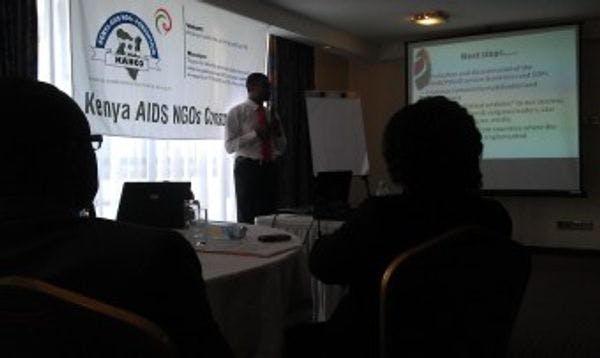Reunión de coordinación entre donantes de la reducción de daños en Kenya
Los participantes expresaron su preocupación por las solicitudes de personas que se inyectan drogas para recibir servicios como programas de agujas y jeringuillas o terapias de sustitución de opiáceos,
actualmente no suministrados por el gobierno, en espera de que se aprueban los procedimientos estándar para el funcionamiento de dichos servicios. Más información, en inglés, está disponible abajo.
Suscríbase a las Alertas mensuales del IDPC para recibir información sobre cuestiones relacionadas con políticas sobre drogas.
On November 13th, 2012, "Harm Reduction Initiatives in Kenya: Donor Coordination Meeting" was held in Nairobi, organised jointly by National AIDS and STI Control Programme (NASCOP) and KANCO.
The meeting was initiated by several donors and partners working in Kenya voicing concerns over risks of uncoordinated action in Kenya in the context of growing international funding to respond to HIV among drug using populations in Kenya.
The meeting gathered representatives from NASCOP, NACADA, NCC, WHO, UNODC, Red Cross, CDC, International HIV/AIDS Alliance, IDPC, MdM, Mainline, KANCO, OSF, GIZ, SAPTA, NOSET, Reachout, Teenswatch, MEWA, Omari and KeNPUD putting together local and national perspective over response programmes which allowed to make preliminary mapping of harm reduction interventions supported or to be supported in near future.
The discussion revealed the need for stronger systematic coordination of activities in Kenya and NASCOP suggested to establish a separate IDU working group (which is currently part of MARPS broader group) to hold regular meetings on the progress and plans, which was well received by the meeting participants.
Some presentations shared best practices in harm reduction in the world and in the region of Sub-Saharan Africa, provided highlights of successful HIV response among IDU in Ukraine.
A separate issue discussed was the need for unified reporting tools to be used among the partners that would allow for accurate data collection and management of potential risks of double-funding. It was agreed to dedicate a special meeting to the issue to present current developments within the programmes and particularly SyrEx database used within CAHR programmes.
The partners raised concerns over coming requests from IDUs to receive services like NSP and OST, which are currently not provided by the government in anticipation of approval of standard operating procedures on NSP and OST. NASCOP updated on the procedures review status by WHO in Kenya and plan to approve them by the end of November 2012.
Keep up-to-date with drug policy developments by subscribing to the IDPC Monthly Alert.
Regiones
Perfiles relacionados
- Community Action on Harm Reduction (CAHR)
- Frontline AIDS
